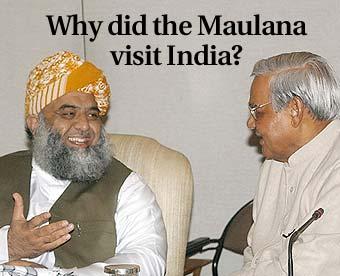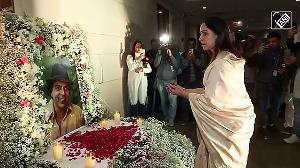
The eventful and somewhat dramatic visit of Maulana Fazlur Rehman, head of Pakistan's Jamiat Ulema-i-Islami [JUI or Islamic Party of Religious Leaders] to India was a well-harmonised Track-II diplomacy, that is, non-governmental diplomacy.
"Between India and Pakistan, a huge amount of Track-II diplomacy is going on and one should expect such events. It fits into the pattern of Prime Minister Atal Bihari Vajpayee's initiatives [vis-à-vis Pakistan]," said an intelligence officer dealing with Pakistan.
The Maulana's Importance
Last year, Rehman missed becoming prime minister of Pakistan by one vote to Mir Zafarullah Khan Jamali. Added to his political clout, the Maulana heads the network that controls most of the madrasas (Islamic religious schools) in Pakistan. Rehman has been elected thrice to the Pakistan National Assembly since 1988.
His father Maulana Mufti Mahmoud was an Islamic scholar and politician who was chief minister of the North West Frontier Province in the 1970s. Mufti believed Partition was wrong and is remembered for his famous quip which still haunts the JUI after East Pakistan became Bangladesh: 'We were not a party to the crime of creating Pakistan.'
Because of his pedigree, Rehman was welcomed in India. Moreover, he has rarely spewed rhetorical statements about Kashmir, something not missed by the Indians.
His hosts in India were Maulana Asad Madani and his son, Maulvi Mehmood Madani. Asad is president and Mehmood, general secretary of the Jamiat Ulema-e-Hind, which is based in Deoband, Uttar Pradesh. Asad's father, Maulana Hussain Ahmad Madani, was well known during the freedom struggle for his opposition to Mohammed Ali Jinnah and the latter's call for Pakistan. The JUH has since been a strong supporter of the Congress, though it is now believed that after the Gujarat riots, it is reconsidering its position.
By inviting Rehman over to India a year before elections are due, it would appear that the JUH has done the Bharatiya Janata Party a favour. Around a month ago, the JUH had sought a green signal from the Vajpayee government to invite Rehman, Mehmood Madani told rediff.com
Anti-America plank
So what are the reasons for Rehman's visit? A Delhi-based expert on India-Pakistan relations and who knows Rehman, offered a possible explanation. He said ever since 9/11, the people of Pakistan think their country's relations anew. He added that the people also realise that Kashmir cannot be won through force and that Pakistan needs to develop economically and socially.
Pakistanis, it would seem, were shaken at how easily their president, General Pervez Musharraf, was forced to ally with America after 9/11. "In the last two years, ordinary Pakistanis have come to believe that America is a bigger enemy than India. This just the slow beginning of a big change," claimed the expert.
Rehman perceptively understood the changing emotion of the average Pakistani and got on top of the anti-America plank. And to show the rest of the world that he is no raving, radical mullah, he visited India where he spoke of the need for peace on the subcontinent, thus seeking to demolish the Western myth that Musharraf is irreplaceable.
Yet, even as Rehman spoke in measured tones in India, he ensured he did not displease his home constituency. Thus, he backed Osama bin Laden and wanted the Taliban back in power in Afghanistan, something New Delhi will never agree to. He did not condemn the terrorist violence in Kashmir, saying, "In that case, I'll have to condemn the violence of the Indian Army also."
The subtle but strategic difference is that he has spoken of resolving the Kashmir dispute "bilaterally," without American or any outside intervention, a line that must be music to New Delhi's ears. Islamabad, on the other hand, has repeatedly sought third party mediation in the dispute.
Observers in New Delhi believe Rehman was in India to set his future course of action in Pakistan. And he tried, albeit in vain, to wear the cap of a dove by chanting peace. His visit also suited the ruling Bharatiya Janata Party, which is keen to show itself as not being anti-Muslim and is seeking a breakthrough on the Kashmir dispute.
Unsuccessful negotiator
Despite his statements in India, Rehman may not be of much help to India. When Prime Minister Atal Bihari Vajpayee visited Lahore in February 1999, the Jamiat-i-Islami had organised demonstrations. And observers point out that among the Islamic jihadi groups operating in Kashmir, Rehman is less powerful than Jamiat-i-Islami chief Qazi Hussain Ahmed.
Rehman and Qazi are also part of the Muttahida Majlis-e-Amal, the Opposition alliance now ruling the NWFP.
When Rehman spoke of peace between India and Pakistan in New Delhi, Qazi was addressing a 4,000-strong crowd in Birmingham, United Kingdom, and declaring that New Delhi must stop calling Kashmir an integral part of India, accept the territory's disputed nature, and solve it with the help of Pakistan and Kashmiris.
Rehman's claim that he has no links with the Taliban can only be called a bluff. It is widely believed that his madrasas, where an extremely orthodox and narrow interpretation of Islam is taught, provided huge numbers of warriors to the Taliban in the Afghan civil war. After the Taliban lost to the Americans, the defeated cadres headed to Kashmir.
On July 20, Rehman spoke at the Observer Research Foundation in New Delhi, and in doing so, revealed what many say is his real concern when he recalled a famous Arabic parable: "In the desert, an Arab lived in a tent. A camel asked for shelter. The Arab expressed his inability to share his tent due to the camel's size. The camel cajoled the Arab to at least allow him to keep his head inside the tent. The Arab agreed And we know what happened [the camel squeezed into the tent and pushed the Arab out]"
No one in the audience missed the analogy with the American presence in Pakistan.
J N Dixit, former foreign secretary and high commissioner to Pakistan, said Rehman had nothing new to offer. "Nevertheless, he is important because his visit is not harming India, and India wants to know his views," he averred.
Hamid Mir, the television journalist based in Islamabad and bin Laden's biographer, warned that Rehman should not be overestimated. "From a religious point of view he is an important figure, but from a political point of view Qazi Hussain Ahmad is more powerful."
Sources at the ministry of external affairs said Rehman's talk should be seen as reflecting the changing mood in Pakistan. The fundamentalists are realising that the old approach of seeking to bleed India through terrorism is not working.
Moreover, whether Rehman can help India and Pakistan achieve a breakthrough in their ties is questionable. Pakistan's Daily Times, in an editorial titled 'Maulana's mess in India', said, ' the maulana has no natural role to play in peace-making.'
The historic part to Rehman's visit came when the maulana met members of Hindu groups involved in the Ayodhya dispute [over whether to build a mosque or a temple at the site], raising suspicions of a hidden agenda. He met members of the Vishwa Hindu Parishad and Rashtriya Swayamsevak Sangh, both outfits known for their strong pro-Hindu, anti-Muslim positions.
N K Sharma, a Hindu priest who was present when Rehman met VHP leaders, said, "His visit will culminate in the rise of matured and moderate views amongst Muslims on the issue of Kashmir and Ayodhya."
Rehman's host, Mehmood Madani, scoffed rumours of a hidden agenda. "He [Rehman] came to create peace between the two nations. He didn't come to talk to Muslims on Ayodhya but if VHP and RSS leaders are impressed by his peace message, Muslims of India will also get the right message."
Madani accepted that to a certain extent, issues between India and Pakistan and disputes between Hindus and Muslims in India are inter-linked.
Not all in the VHP have welcomed Rehman. VHP leader Dr Pravin Togadia sees a hidden agenda concerning Ayodhya. "The Muslim elite in India want to settle the Ayodhya issue. They want to get fundamentalist Muslims to agree to hand over the site to Hindus. Who can make the fundamentalist Indian Muslims settle the issue but a bigger fundamentalist?" he said.
Madani dismisses Togadia's allegations as baseless.
Agent provocateur?
A diplomat in New Delhi told rediff.com, "The maulana's message was quite clear. It says: As a Pakistani I have a problem with India. But as a Muslim, I have no problems with Hindus and I can communicate with them."
A K Verma, former chief of the Research and Analysis Wing, India's external espionage agency, says, "The maulana will be going back with an idea about what ticks in India. In some ways, it will educate Pakistanis but beyond that I don't see any importance of his visit."
"Basically, he is an agent provocateur," Verma declared. "He wanted to provoke India to make some anti-America comment."
Rehman's critics point out that he has not spoken about the role of fundamentalist Islam, which is being questioned by liberalised societies in South Asia. Moreover, his party is implementing the tenets of the Shariat in the North West Frontier Province. And he refused to acknowledge the links between Islamic jihadis in Afghanistan and Kashmiri terrorists.
Sushant Sareen, director, Pakistan studies, Observer Research Foundation, says it is not fair to blame the maulana alone. "The latest report by Dr A H Nayar in Pakistan claims the doctrine of jihad is taught in State-owned schools of Pakistan and not in the madrasas."
Rehman made headlines when he said the Line of Control dividing Kashmir India and Pakistan could become the international border provided India, Pakistan, and the Kashmiris agree. Later, he retracted his statement.
A retired general doubted Rehman's bona fides: "He is militant and fundamentalist on Pakistan's western border where he supports Osama bin Laden and wants the Taliban back in Kabul. The same man, on the eastern border, talks peace with Vajpayee and asking for the peaceful solution of Kashmir. How can anyone make sense of this contradiction?"
Sareen still prefers to give Rehman the benefit of the doubt. "Everybody will agree that he is a man who genuinely believes in peace with India. It is advantageous and necessary for India to hear this man who is linked to ground realities, unlike President Pervez Musharraf who is anti-India and pro-America."
Photograph: PRAKASH SINGH/AFP/Getty
ALSO READ:
An Interview with Maulana Fazlur Rehman





